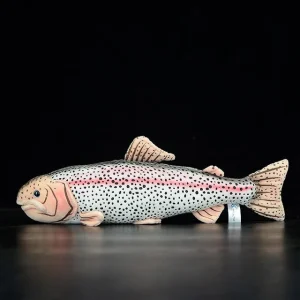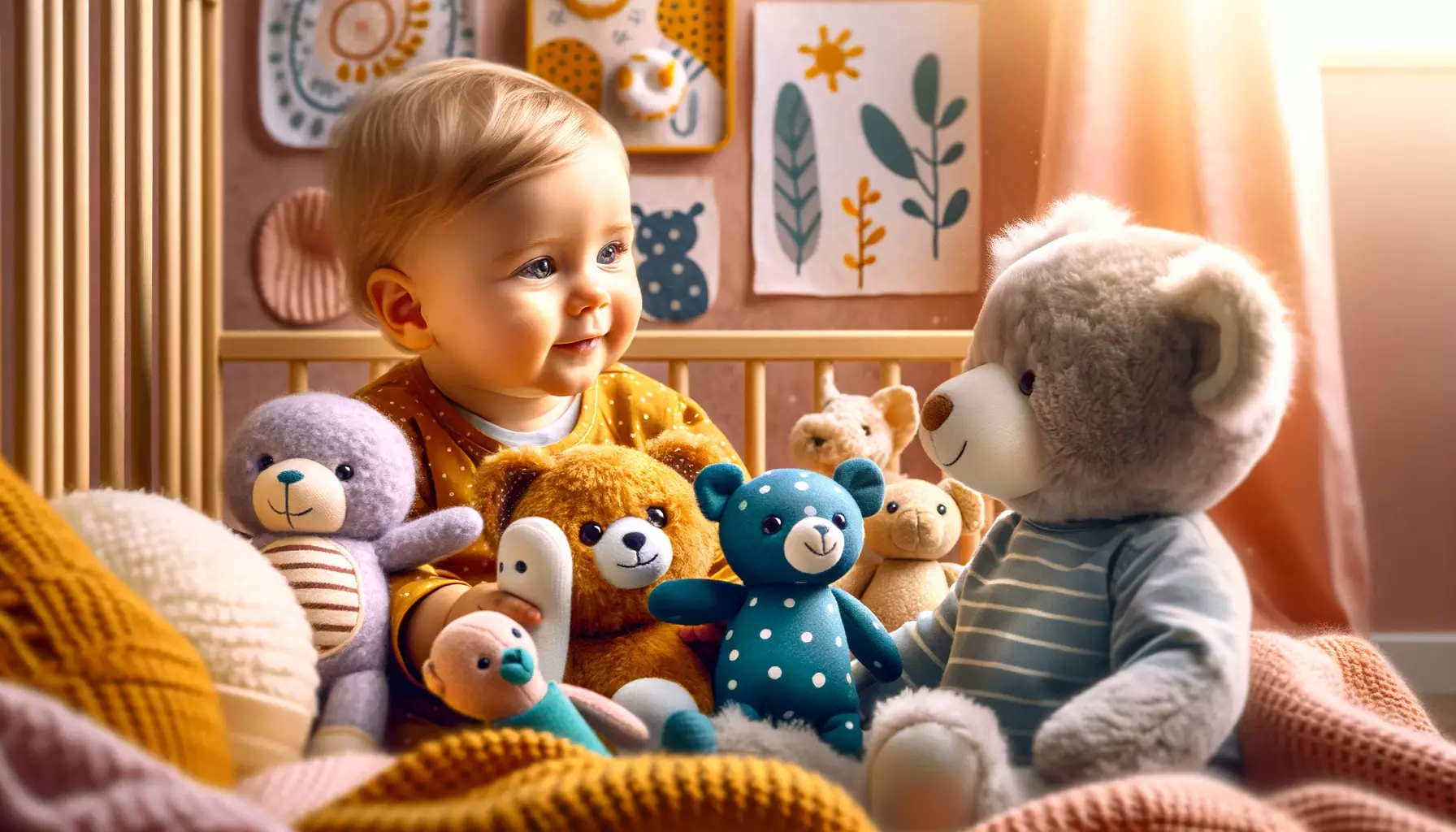Welcome to a world where babies find comfort and joy in their cherished stuffed animals! Ever wondered why these fluffy companions are more than just toys for little ones? Dive into the realm of emotional development and discover why stuffed animals play a crucial role in shaping a baby’s world.
Curious about the magic these cuddly creatures bring to a child’s life? Stay tuned to unravel the secrets behind the bond between infants and plush toys.
In this article, we’ll explore the significance of stuffed animals in a baby’s growth journey and unveil the myriad benefits they offer. Get ready to uncover the heartwarming connection between babies and their beloved plush pals!
Get ready to learn how these furry friends provide security, boost cognitive skills, and nurture emotional well-being in our little ones.
Let’s embark on an exciting adventure into the world of baby development, where stuffed animals play a starring role in shaping happy and healthy little hearts and minds. Ready to explore the wonders of this special bond?
Key Takeaways
- Stuffed animals foster emotional comfort, security, and trust in babies.
- They enhance cognitive development through sensory exploration and pretend play.
- Playing with plush toys promotes social skills, empathy, and communication in infants.
- Stuffed animals stimulate imagination, creativity, and storytelling abilities in young minds.
Emotional Comfort and Security
Stuffed animals are essential for babies’ emotional comfort and security in times of distress or uncertainty. Babies naturally turn to their plush toys for solace, hugging them for reassurance.
This hugging action helps babies learn to soothe themselves, creating a feeling of safety and protection. Plush toys serve as reliable sources of stability, assisting babies in managing their emotions effectively.
Cognitive Development Benefits
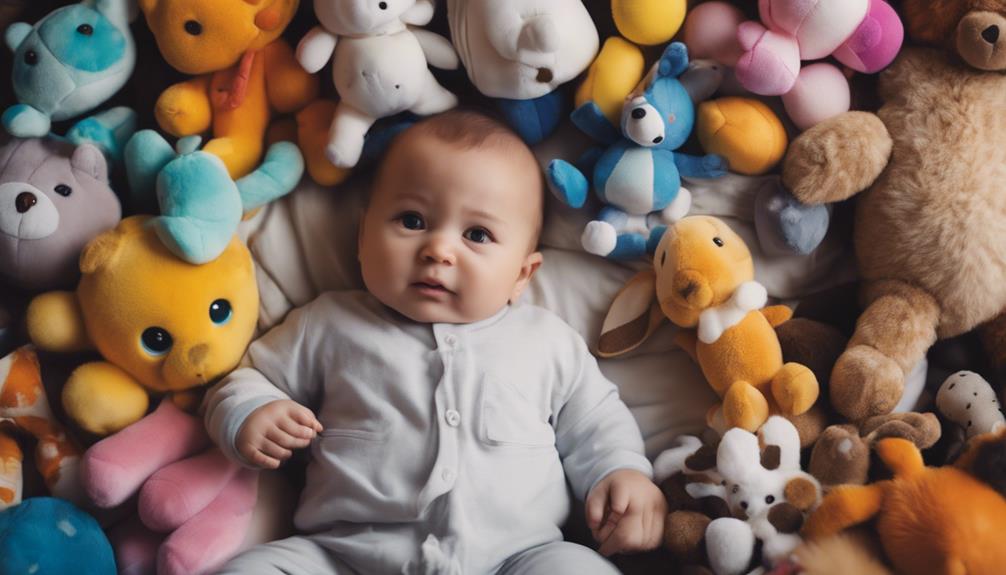
When exploring the cognitive benefits of stuffed animals for babies, it’s essential to recognize how these toys actively engage and stimulate young minds. Playing with stuffed animals can significantly boost cognitive development by enhancing senses, improving hand-eye coordination, and encouraging sensory exploration.
Interacting with these toys helps babies grasp concepts like cause and effect, object permanence, while also fueling their imagination and creativity – all crucial elements for cognitive growth. So, incorporating stuffed animals into playtime can be a fun and educational way to support your baby’s cognitive development!
Social Skills Enhancement
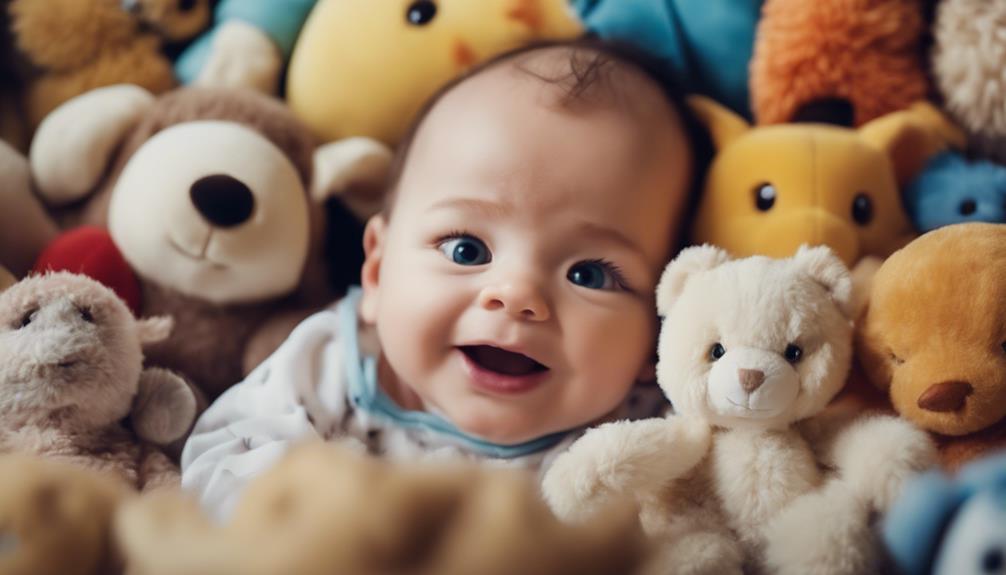
Enhancing social skills through interactions with stuffed animals is a crucial aspect of early childhood development. Playing with these toys not only brings joy but also nurtures essential skills. When children engage in pretend activities with stuffed animals, they’re encouraged to mimic caregiving roles, fostering empathy and understanding.
Stuffed animals serve as wonderful companions for children, facilitating conversational turn-taking that’s vital for language and social skill development. These toys can be powerful tools in helping kids learn how to engage in meaningful interactions and build relationships.
Whether it’s at daycare, at home with siblings, or during playdates with friends, engaging in pretend play with stuffed animals is a fun and effective way to enhance social skills. Through these playful interactions, children learn how to communicate, cooperate, and empathize with others.
Imagination and Creativity Stimulation
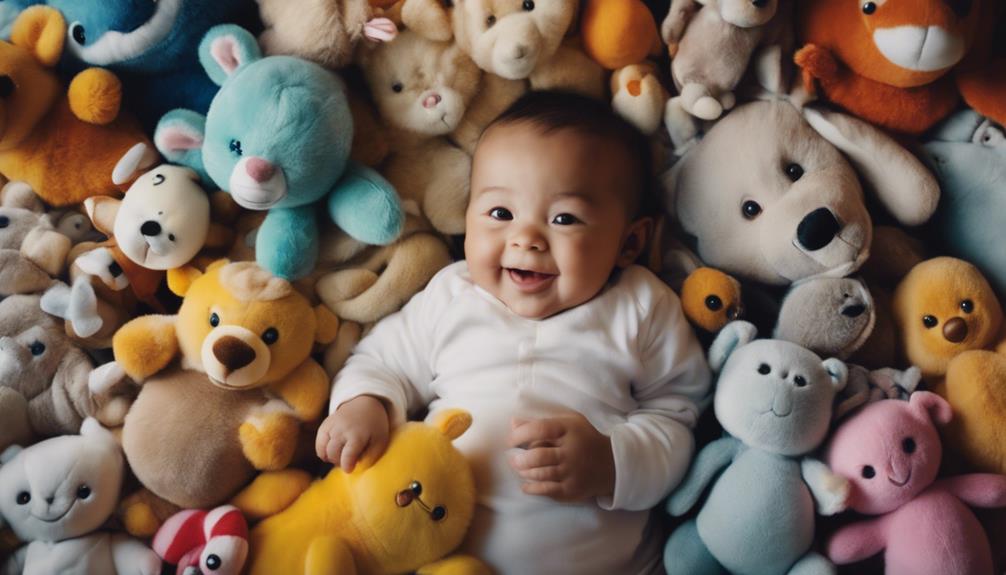
Playing with stuffed animals can spark your child’s imagination. It allows them to create magical worlds and elaborate scenarios. Through role-playing with plush toys, your little one can develop their storytelling abilities and engage in social interactions with their furry friends.
Encouraging your child to explore different roles and narratives with their stuffed animals can greatly enhance their creativity and cognitive skills.
Enhancing Role-Playing Skills
Engaging in role-playing with plush toys isn’t only fun for babies but also incredibly beneficial for their development. Here’s why it’s such a valuable activity:
- Cognitive Development: Role-playing with stuffed animals stimulates babies’ brains, helping them learn to think critically and solve problems.
- Exploration of Roles: Stuffed animals provide a safe space for babies to explore different roles and scenarios, fostering a sense of imagination and creativity.
- Enhanced Creative Thinking: Interacting with plush toys encourages babies to think outside the box, coming up with unique storylines and solutions to imaginary situations.
- Problem-Solving Skills: Through pretend play with stuffed animals, babies learn to navigate challenges and obstacles, honing their problem-solving abilities in a fun and engaging way.
Encourage your little one’s imagination and cognitive skills by incorporating role-playing with plush toys into their playtime routine—it’s not just play, it’s a valuable learning experience!
Fostering Storytelling Abilities
To enhance your baby’s storytelling skills and ignite their imagination and creativity, incorporating stuffed animals as characters in their playtime adventures can be incredibly beneficial.
By immersing your little one in these make-believe worlds with plush toys, they can boost their language abilities and grasp narrative structures more deeply.
Engaging in storytelling with stuffed animals not only sparks creativity but also helps strengthen your baby’s communication skills.
It’s a fun and effective way to nurture their storytelling talents and foster a love for imaginative play.
You might also be interested in the following articles:
Encouraging Social Interaction
Looking to boost your baby’s social skills and foster their creativity? Dive into interactive play sessions with stuffed animals to unlock a world of imagination and exploration!
- Empathy Development: Encourage empathy in children by nurturing their stuffed animal friends.
- Relationship Building: Use plush toys to help children create and maintain relationships with others.
- Communication Skills: Role-play scenarios with stuffed animals to enhance communication skills in a fun way.
- Collaborative Play: Foster collaborative interactions among babies through imaginative play with plush toys.
Engage your little one in these enriching activities to promote social interaction and cognitive development in a playful and engaging manner!
Empathy and Compassion Nurture
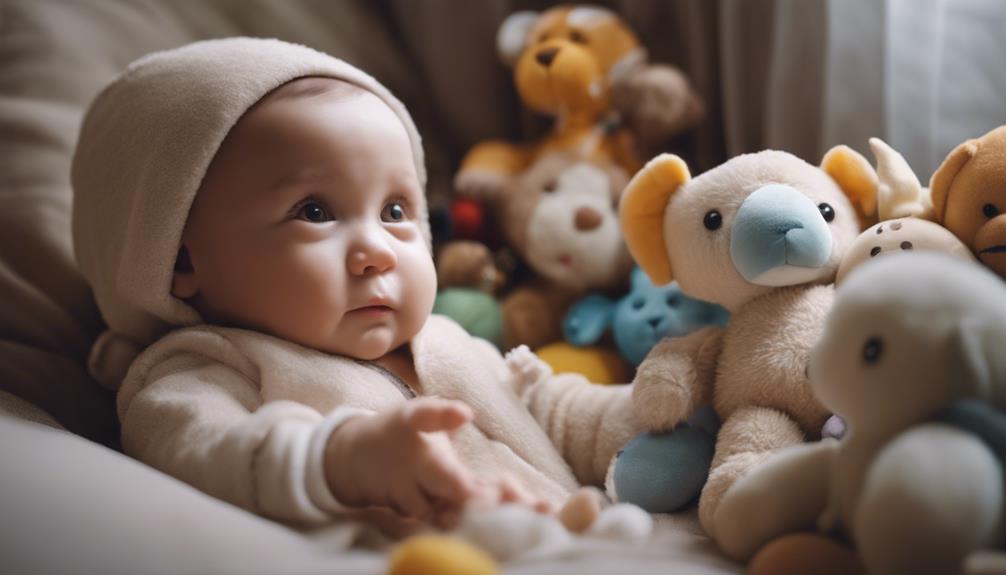
As you interact with stuffed animals, you’re laying the foundation for empathy and compassion in your child.
Research shows that caring for plush toys can help children understand and appreciate the feelings of others.
Through play and nurturing of their toys, kids develop important emotional skills that shape their ability to connect with those around them.
Emotional Development Support
Why Interacting with Stuffed Animals is Key for Developing Empathy in Children
Engaging with stuffed animals from an early age is a powerful way to cultivate empathy and compassion in children. Here’s why:
- Responsibility and Empathy: Taking care of plush toys teaches children responsibility and empathy as they tend to the needs of their beloved companions.
- Consideration and Compassion: Playing with stuffed animals encourages children to think about the feelings and requirements of their toys, fostering compassionate behavior towards others.
- Companionship and Connection: Stuffed animals become cherished companions that children can nurture, leading to the formation of empathetic bonds that extend to their interactions with people.
- Empathy Development: The emotional connection formed with stuffed animals helps children develop empathy and compassion, shaping their relationships with others in a positive way.
Incorporating interactions with stuffed animals into a child’s routine can have a profound impact on their emotional development, fostering essential skills that contribute to their social and emotional well-being.
Comfort and Security Source
Building Empathy Through Stuffed Animals
Creating a nurturing environment for your child is essential in developing their sense of comfort and security. Interacting with stuffed animals can play a pivotal role in fostering empathy and compassion from an early age.
Children form deep bonds with their plush toys, which helps them learn the importance of caring for others and considering their feelings. By comforting and engaging in conversations with their toys, kids grasp the significance of nurturing and showing empathy. This, in turn, encourages them to display compassionate actions towards others in their daily interactions.
Incorporating stuffed animals into your child’s routine can have a profound impact on their emotional development. Start this practice early on to instill these values and watch as your child grows into a kind, empathetic individual.
Attachment Formation Importance
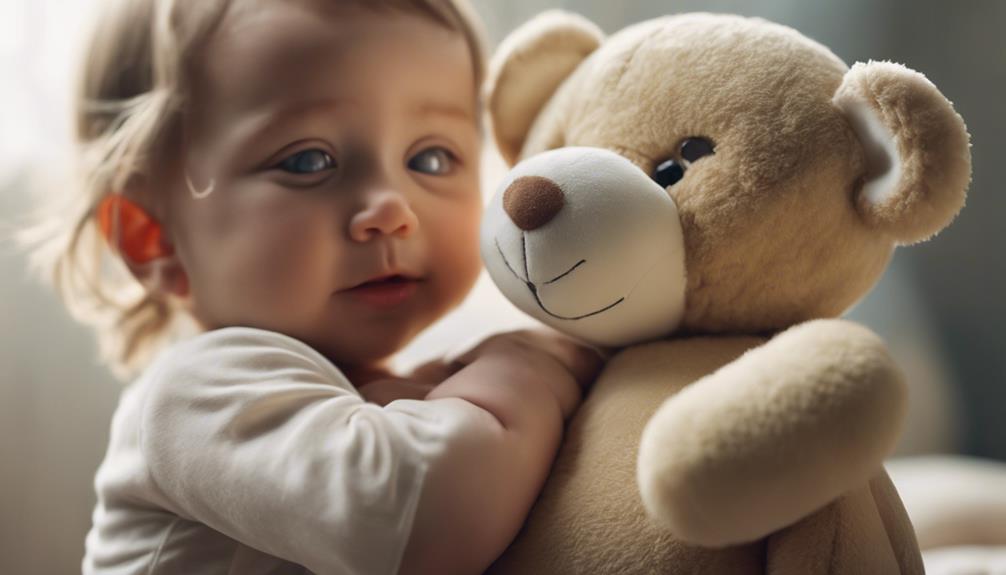
Nurturing your child’s attachment to a stuffed animal plays a crucial role in their emotional well-being and development.
- Building Trust and Comfort: Babies form a sense of trust and comfort by bonding with a plush toy.
- Consistent Comfort: Stuffed animals provide reliable comfort, supporting the formation of secure attachments.
- Emotional Stability and Security: Attachment to a stuffed animal fosters emotional stability and a sense of security in young children.
- Positive Impact on Development: This bond positively influences a baby’s emotional development and overall well-being.
Encouraging your little one’s connection with a stuffed animal can have lasting benefits, promoting a sense of security and emotional resilience in their early years.
Transition and Adaptation Support

Transition and Adaptation Support
In periods of change and adjustment, stuffed animals play a vital role in offering comfort and stability to babies. These lovable companions provide solace and reassurance, aiding little ones in navigating new experiences with familiarity. Whether it’s the transition to school or other challenges, the constant presence of a stuffed animal can assist in managing changes smoothly.
Their comforting presence is a valuable support for babies in adapting to different environments, simplifying the adjustment process for them.
Independence and Decision-Making
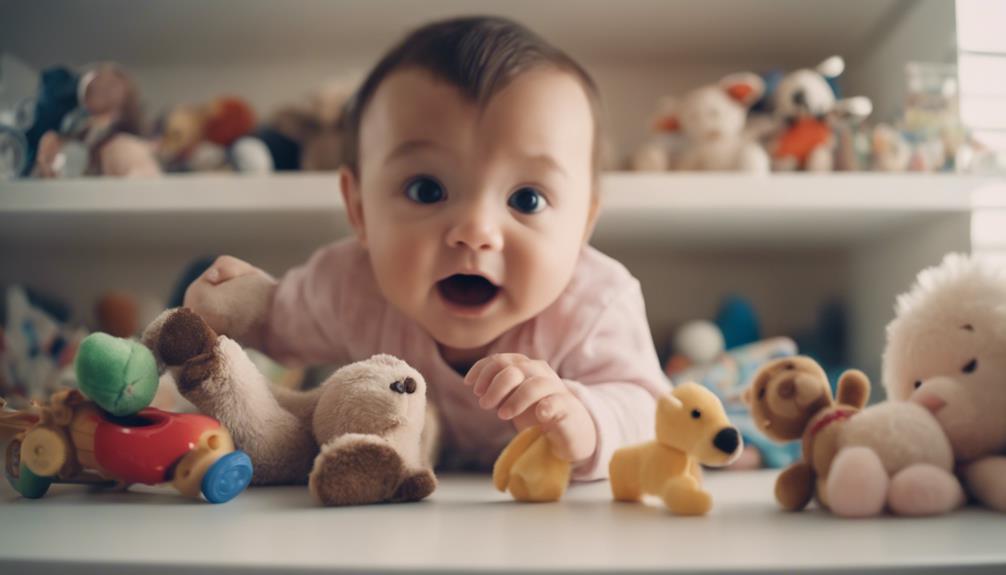
Caring for stuffed animals allows children to develop their independence and decision-making skills as they take responsibility for their plush companions.
By nurturing their stuffed animals, kids learn to make choices and take ownership of their actions, laying the foundation for future decision-making abilities.
Encouraging this sense of responsibility early on can help children feel more confident in making important life decisions as they grow.
Building Self-Soothing Skills
Building Self-Soothing Skills
To nurture independence and decision-making skills in babies, fostering their connection with stuffed animals is a powerful and effective strategy.
- Encourages self-soothing behaviors: By bonding with their favorite plush companions, babies learn to comfort themselves and manage their emotions independently.
- Builds a sense of security and comfort: The presence of a familiar stuffed animal can provide a source of reassurance and stability for babies, promoting a feeling of safety.
- Promotes autonomy in managing emotions: Through interactions with their stuffed animals, babies develop the skills to regulate their feelings and cope with various situations.
- Enhances confidence in making choices: Allowing babies to choose and engage with their preferred stuffed animals empowers them to make decisions and assert their preferences.
Cultivating a strong connection between babies and their stuffed animals not only supports their emotional development but also lays a foundation for self-soothing and decision-making skills that will benefit them as they grow.
Encouraging Emotional Expression
Encouraging emotional expression in children through interactions with stuffed animals can greatly enhance their independence and decision-making skills.
Plush toys create a safe space for kids to freely explore and express their feelings. By taking care of their toys, children learn to make choices and develop a strong sense of autonomy.
This emotional bond with their toys empowers children to confidently articulate their emotions and make decisions, laying a solid groundwork for their future independence.
Fostering Sense of Security
Enhancing Independence and Decision-Making Skills in Babies with Stuffed Animals
Creating a sense of security in babies through their interactions with stuffed animals plays a crucial role in boosting their independence and decision-making abilities. These cuddly companions not only offer comfort but also foster a sense of responsibility and autonomy in infants. Encouraging babies to take care of their plush friends helps them practice making choices and decisions from an early age.
Communication Skills Practice
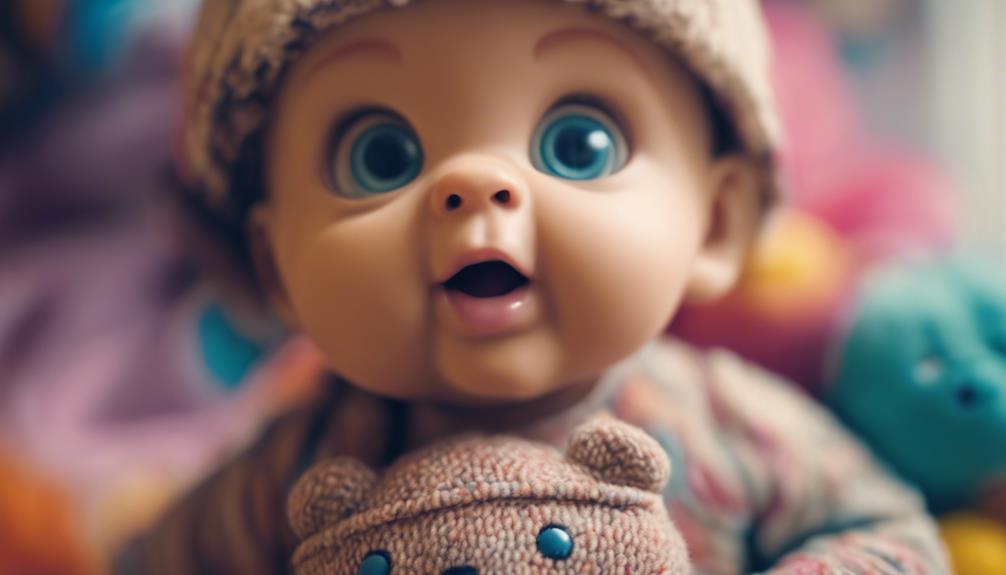
Enhance Your Baby’s Communication Skills Through Conversations with Plush Toys
Interacting with plush toys can be a fantastic way to boost your baby’s social and communication skills. By engaging in dialogues with their stuffed companions, babies can express themselves, practice turn-taking, and develop their language abilities. This interactive play not only encourages verbal communication but also makes learning fun and engaging for your little one.
Encourage your baby to chat with their plush toys as a playful and beneficial activity. It’s a great way for them to explore language, express their thoughts, and learn the art of conversation. So, grab those stuffed animals and let the talking begin to help your baby thrive in their communication skills!
Separation Anxiety Management

If your little one is facing separation anxiety, introducing their beloved stuffed animal can be a game-changer in providing comfort and reassurance during times of separation.
- The presence of a familiar plush toy can offer emotional support.
- Babies often develop strong attachments to stuffed animals, which can help ease distress.
- Stuffed animals are excellent tools for managing separation anxiety.
- Offering a plush toy can promote continuity and comfort for your baby during times of separation.
Emotional Autonomy Development
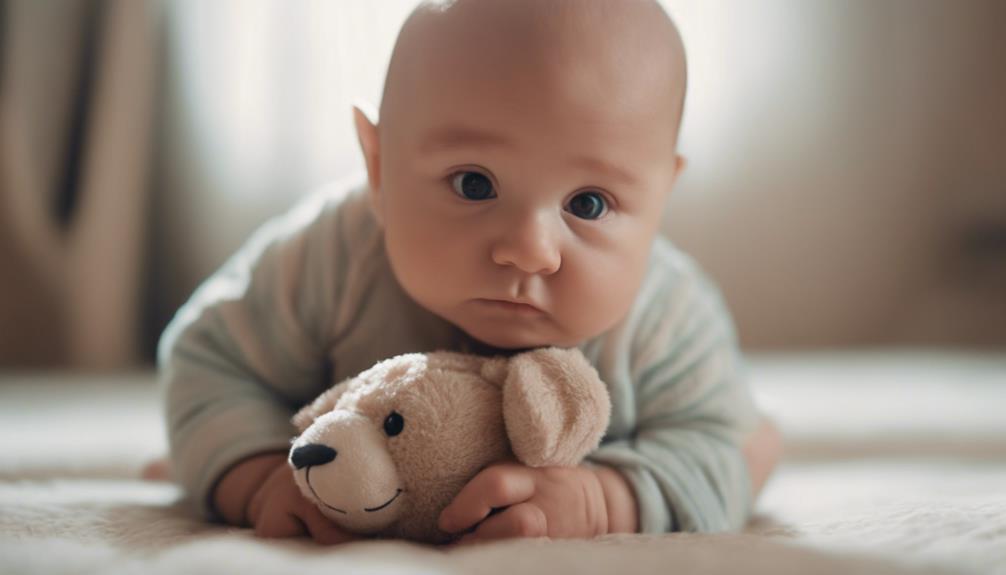
Foster Your Child’s Emotional Autonomy Through Stuffed Animal Care
Encouraging emotional autonomy in children plays a pivotal role in their holistic development and well-being. One effective way to nurture this independence is through the simple act of caring for stuffed animals. This practice not only helps children in managing their emotions but also cultivates essential self-soothing skills that are fundamental for their emotional health and self-assurance. By comforting their beloved toys, children not only show compassion but also learn to comfort themselves, laying a robust foundation for healthy emotional growth.
When children engage in nurturing their stuffed animals, they embark on a journey towards:
- Emotional Independence: Caring for their stuffed companions empowers children to take charge of their emotions independently.
- Development of Self-Soothing Skills: Through the process of tending to their toys, children acquire valuable skills in self-soothing, aiding in emotional regulation.
- Building Resilience: Comforting their toys in times of distress helps children develop resilience, equipping them with the strength to face challenges.
Education in Social Life
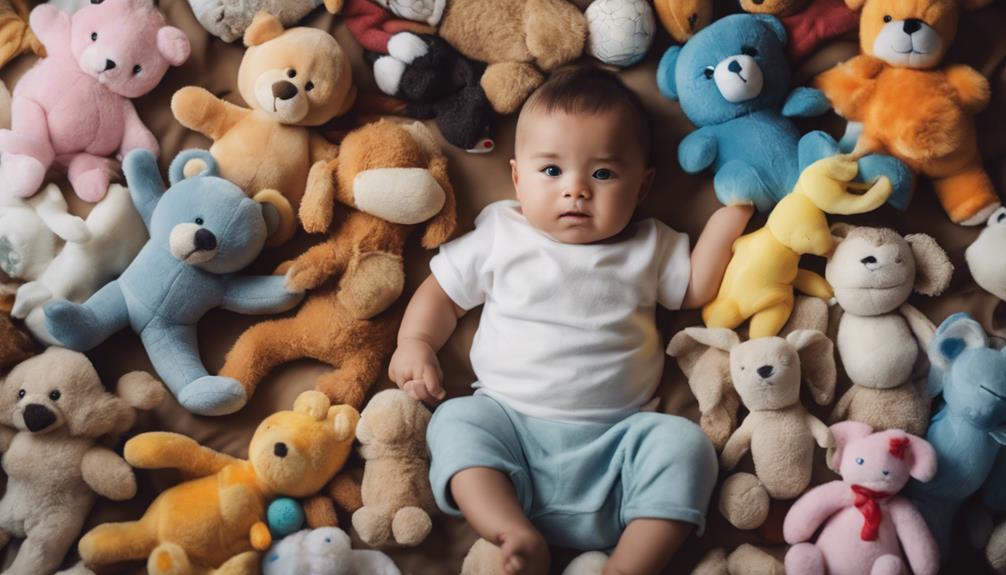
Stuffed animals play a vital role in a baby’s social education, encouraging meaningful interactions and fostering essential skills. Here’s why they’re crucial:
- Empathy Development: Stuffed animals provide a safe space for babies to practice empathy by caring for their plush companions, understanding their needs, and showing compassion.
- Emotional Understanding: Through play with plush toys, babies learn to recognize and manage emotions, helping them navigate their own feelings and understand those of others.
- Relationship Lessons: Pretend play with stuffed animals allows babies to explore different roles and relationships, teaching them about communication, cooperation, and social dynamics.
- Companionship and Social Exploration: Stuffed animals become trusted companions for babies, supporting them as they venture into imaginative social scenarios, boosting creativity and confidence.
Choosing the Right Stuffed Animal
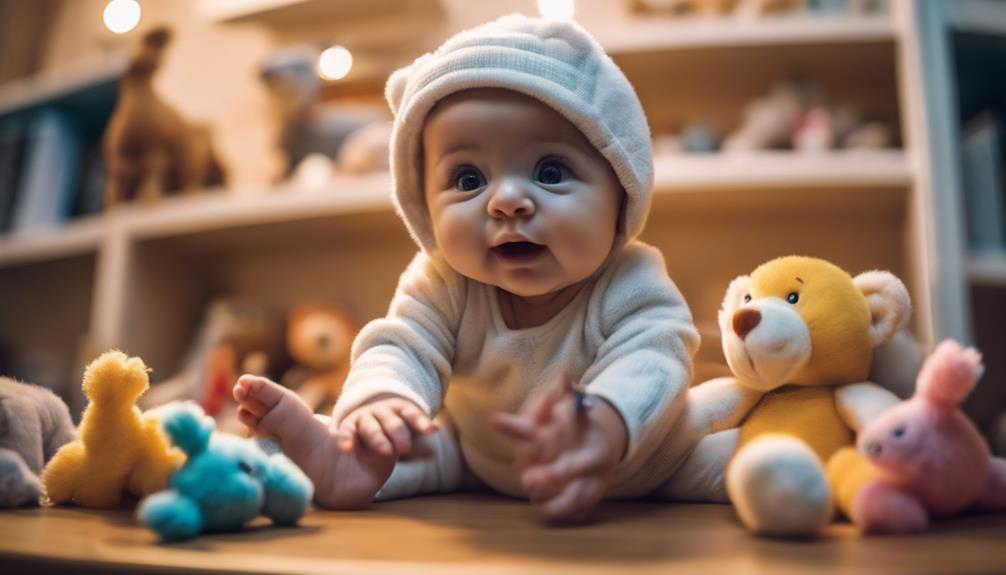
When choosing a stuffed animal for your little one, it’s crucial to prioritize safety and comfort. Opt for plush toys crafted from gentle, hypoallergenic materials to prevent any skin sensitivities. Select toys with embroidered features instead of detachable parts to steer clear of potential choking risks. Look for options that are machine-washable for effortless cleaning.
Opt for vibrant colors and contrasting patterns to spark your baby’s visual development and keep them engaged. Remember, a well-chosen stuffed animal can be a source of endless comfort and joy for your little bundle of joy!
Frequently Asked Questions
Why Do Babies Need Stuffed Animals?
When babies need stuffed animals, it’s for emotional comfort and attachment security. These plush buddies offer sensory stimulation and aid in cognitive development. They become trusted companions, helping infants navigate the world with reassurance and warmth.
How Do Stuffed Animals Help With Child Development?
Stuffed animals support cognitive development by fostering creativity and imagination, while providing emotional support through attachment and comfort. They help children form relationships, develop empathy, and enhance communication skills, contributing to well-rounded development.
What Is the Significance of Stuffed Animals?
For you, stuffed animals offer emotional support, comfort, and security. They become loyal companions during tough times, providing a sense of solace and familiarity. These plush pals help you navigate the world with a gentle touch.
What Are the Benefits of Stuffed Animals?
You know that stuffed animals provide emotional support and comfort to babies. They foster attachment and security, helping little ones feel safe. These plush companions are essential for your baby’s well-being, offering comfort and a sense of security.
Conclusion
As you continue to provide your baby with a comforting stuffed animal, remember that 60% of children form strong emotional attachments to their plush toys. This can positively impact their emotional well-being and development. Keep nurturing your little one’s imagination, social skills, and empathy through their cuddly companion.
Your efforts in choosing the right stuffed animal can truly make a difference in your baby’s growth and happiness.


